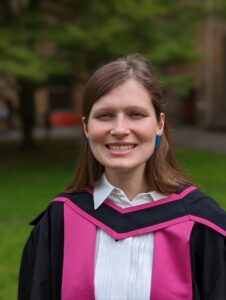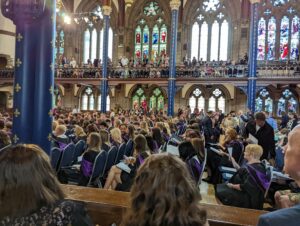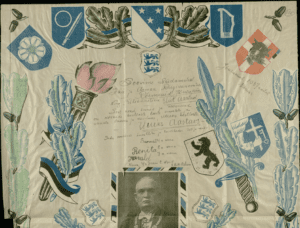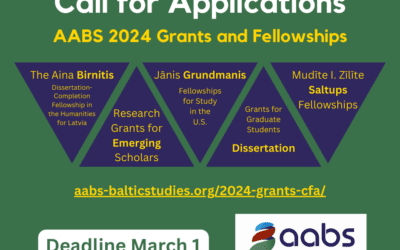AABS is pleased to recognize Liisi Veski for the completion of her dissertation “Towards a stronger national unity: organic-statist ideas in 1930s
Estonia,” for which she received the AABS Dissertation Grant in the 2021-2022 cycle.

©Liisi Veski, 2022
Dr. Liisi Veski is a research fellow in the history of political thought at the Skytte Institute, University of Tartu. She recently earned a PhD in Central and East European Studies from the University of Glasgow. Her current project, “The school for democracy: co-operation, civil society, and intrastate federalism in Estonian intellectual history, 1900–1940”, is funded by the Estonian Research Council. Additionally, she is contributing to a multi-author intellectual biography of the former Estonian prime minister, Jüri Uluots (1890–1945). She has taught courses in the history of political thought, East and Central European history, and intellectual history of nationalism at the University of Glasgow, UCL, and University of Tartu. She also serves as an editorial coordinator of the Journal of Baltic Studies and editorial assistant of the Estonian Historical Journal (Ajalooline Ajakiri).
The Impact of an Award: Report from Liisi Veski
After the completion of her dissertation, Liisi Veski submitted a reflection to AABS.
We thank her for her permission to publish her thoughts, which have been lightly edited.
In 2017, I began my PhD studies at the School of Social and Political Sciences, University of Glasgow. In June 2022, I was finally handed my diploma in the historical Bute Hall of Glasgow University. My PhD thesis, “Towards a stronger national unity: organic-statist ideas in 1930s Estonia”, focussed on intellectual history of nationalism and statism in 1930s Estonia. I examined how the elite of the authoritarian regime of Konstantin Päts understood and sought to reframe the relationship between the individual, the state, and the nation to legitimise the new political order established in 1934. Relying on the methods of conceptual history, I studied national unity, national community, and a number of related concepts. On the one hand, I traced the roots of these concepts and ideas. On the other hand, I analysed how political figures used them in specific political contexts. I focused on a group of individuals who belonged to the elites of Päts’ regime. I wish to show that these people around Päts deserve to be studied as significant contributors to the authoritarian regime. I also demonstrated that a biographical context is needed to understand these figures’ ideas.
I received the AABS Dissertation Grant at a crucial stage of my PhD studies. During the first three years I had been funded by the College of Social Sciences. In autumn 2020, however, the scholarship had come to an end – and with that, the additional allowance to cover various research expenses had finished. Due to the general travel restrictions brought about by the global pandemic, I did not have a chance to present the key findings of my dissertation at the stage where it was nearing completion: all conferences and summer schools that had accepted my papers were naturally either cancelled or postponed. And the time to use the research allowance provided by the College of Social Sciences was coming to an end. This is why receiving the AABS Dissertation Grant in the fourth year of my PhD program had such a significant impact: it helped to cover various research expenses and therefore give opportunities that would otherwise not have been available for me in the final writing-up stage of my PhD.

Bute Hall, University of Glasgow
©Liisi Veski
First, the Grant helped to cover the copy-editing expenses of my dissertation. The thesis was edited by Dr Kirsty Kay who is an experienced copyeditor and a scholar of Central and East European Studies. Without the Grant, I would not have been able to have the dissertation copy- edited at all, let alone by someone as experienced and knowledgeable in the field as Kirsty. Due to her extensive background in editing books in social sciences, she did not only work on the matters of language, but also kept a close eye on the consistency and the overall clarity of the argument – both particularly critical in projects that are as substantial as a monograph. My dissertation is undeniably much clearer and coherent thanks to Kirsty’s excellent work. I defended the thesis with only very minor corrections in December 2021.
Currently, I am in the process of drafting a book proposal to have the book published. My supervisors, Prof David Smith (University of Glasgow) and Prof Pärtel Piirimäe (University of Tartu), believe that the dissertation could be published as a book with very minor extra work. I am also in the process of developing some of the chapters into independent research papers.
Another important opportunity that was made available by the AABS Dissertation Grant was participation in the Sixth International Conference of the European Society for the History of Political Thought, entitled “In the Search of the Common Good”. The conference took place on 25–26 August 2022 at the University of Helsinki. It was the first in-person conference since the start of the pandemic where I could present my research. Originally, the conference had been scheduled for August 2020, but naturally it was postponed for two years. When I first applied, I intended to use the research allowance provided by the College of Social Sciences. However, as explained earlier, this was not available for me two years later when the conference finally took place. Therefore, it would not have been possible for me to participate without the AABS Dissertation Grant.

Children from Narva send Christmas and New Year greetings to Konstantin Päts in 1937 (the National Archives of Estonia)
I presented my paper “Searching for the limiting notion: drafting the 1937 constitution of Estonia and the rhetoric of the common good”, where I introduced some of the core conclusions of my thesis. One of the key arguments was that the 1937 constitution of Estonia, particularly the articles that regulated the civil rights and duties, was greatly inspired by the 1935 constitution of Poland. My paper provided an interesting case study of how the core concept in the history of political thought, common good, was applied by 1930s authoritarian regimes in Central and Eastern Europe. I received some useful feedback, and the paper will potentially be published in the conference proceedings. During the event, I also had a chance to discuss a potential research visit to the University of Helsinki in the near future.
In September 2022, I will start my first postdoctoral research project, “The school for democracy: co-operation, civil society, and intrastate federalism in Estonian intellectual history, 1900–1940” at the Skytte Institute, University of Tartu. The project is funded by the Estonian Research Council, and it will focus on the history of co-operative thought in Estonia in the years 1900–1940. I will study how co-operation was understood and conceptualised by some of its leading advocates in Estonia, and how the co-operative movement was used as a way of reining in the influence of the central administration and fostering the Estonianspeaking civil society in the last decades of the Russian Empire and in interwar Estonia. The AABS Dissertation Grant has played an important role in helping to lead me to this next stage in my academic career.
– Liisi Veski, 2022
Liisi Veski
What is the Dissertation Grant?
AABS Dissertation Grants for Graduate Students are grants of up to $4,000 to support doctoral dissertation research and write-up in any field of Baltic Studies. Funds may be used for travel to research site, equipment, duplication or other needs as specified. Proposals are evaluated according to the scholarly potential of the applicant, and the quality and scholarly importance of the proposed work, especially to the development of Baltic Studies.
The application deadline for academic year 2023-2024 is February 1, 2023. Applications will be evaluated by the AABS 2023–2024 Grants Committee consisting of AABS VP for Professional Development Dr. Kaarel Piirimäe, AABS President Dr. Dovilė Budrytė, and AABS Director-at-Large Dr. Daunis Auers. Award notifications will be made in April 2023.
Other Grants and Fellowships News
Vanished Lands: Book Publication Subvention Report by Laima Vincė Sruoginis
The Association for the Advancement of Baltic Studies (AABS) is pleased to recognized the successful conclusion of a Book Publication Subvention Grant awarded to Peter Lang Publishers for publishing the book Vanished Lands: Memory and Postmemory in North American...
Elīna Vikmane Birnitis Fellowship Report on Advancing Cybermuseology
AABS is pleased to recognize Elīna Vikmane for the completion of her dissertation "Advancing Cybermuseology: Diffusion of digital innovation in Latvia’s museum sector," for which she received the 2022–2023 Aina Birnitis Dissertation-Completion Fellowship in the...
AABS 2024 Grant and Fellowship Applications Open
Call for Applications AABS 2024-2025 Grants and Fellowships Research Grants for Emerging Scholars The Aina Birnitis Dissertation-Completion Fellowship in the Humanities for Latvia Mudīte I. Zīlīte Saltups Fellowships Jānis Grundmanis Fellowships for...



